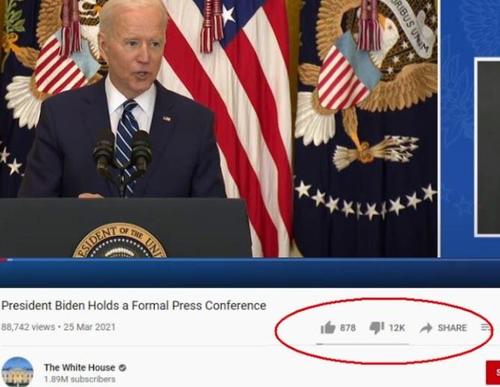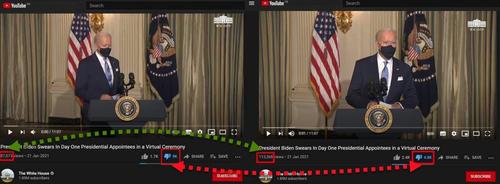Youtube, the video hosting platform owned by Google, announced on March 29 that they are going to test making the “dislike” count on videos invisible.
“In response to creator feedback around well-being and targeted dislike campaigns, we’re testing a few new designs that don’t show the public dislike count,” YouTube announced on Twitter.
“If you’re part of this small experiment, you might spot one of these designs in the coming weeks.”
It further states on a Google support page:
“Viewer feedback has always been, and will continue to be, an important part of YouTube. But we’ve heard from creators that the public dislike counts can impact their wellbeing, and may motivate a targeted campaign of dislikes on a creator’s video. So, we’re testing designs that don’t include the visible like or dislike count in an effort to balance improving the creator experience, while still making sure viewer feedback is accounted for and shared with the creator. ”
A majority of responses on both the Twitter announcement and on the support page disapprove of the idea, with some comments suggesting the move is a consequence of the tremendous imbalance of “dislikes” on the present administration’s videos on their White House channel.
Some other commentators expressed concerns that it would not be good for people who want to obtain feedback about the video quality, whether it be for creators or viewers.
In January, YouTube deleted what appears to be thousands of “dislikes” from videos on the official channel of President Joe Biden’s White House. The company said it’s a part of its regular efforts to remove engagement it considers inauthentic.
People on the platform noticed that dislikes have been disappearing by the thousands from several White House videos and started posting before-and-after screenshots on social media shortly after the incoming administration took over the channel and published its first videos.
The screenshots indicate a total of at least 16,000 dislikes were removed from at least three videos. Even after the adjustments, the five videos on the channel had about 14,000 likes combined versus nearly 60,000 dislikes as of 3:30 p.m. on Jan. 21.
In response to a screenshot of one of the videos, YouTube told The Epoch Times that it’s monitoring engagement on the site to detect and remove activity it considers spam so that only engagement it considers organic remains. The mechanism worked as intended in the case of the Biden video, the company stated.
“YouTube regularly removes any spam likes or dislikes from your videos,” the company stated in a 2019 tweet.
“It may take up to 48 hours for the numbers to be updated.”
It isn’t clear how YouTube discerns between authentic and inauthentic engagement; the company didn’t immediately respond to a request for further details.
“No one wants this,” Nerdrotic, a pop-culture YouTuber tweeted, adding, “Dislikes are helpful for a great many things and this is what puts YouTube above all others.”
YouTube and its owner, Google, have long faced accusations of political bias. The companies have said their products are developed and run as politically neutral, but employee accounts and leaked internal materials indicate the companies are indeed infusing their politics into their products.
Google shifted millions of votes in the Nov. 3, 2020, presidential election by pushing its political agenda onto its users, according to research psychologist Robert Epstein, who assembled a team of more than 700 voters to monitor what results they were receiving from channels such as search results, reminders, search suggestions, and newsfeeds ahead of the election.
YouTube Unveils Hide Feature After Americans Mass-'Dislike' Biden Videos | ZeroHedge



No comments:
Post a Comment